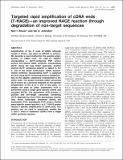Targeted rapid amplification of cDNA ends (T-RACE)-an improved RACE reaction through degradation of non-target sequences
Abstract
Amplification of the 5' ends of cDNA, although simple in theory, can often be difficult to achieve. We describe a novel method for the specific amplification of cDNA ends. An oligo-dT adapter incorporating a dUTP-containing PCR primer primes first-strand cDNA synthesis incorporating dUTP. Using the Cap finder approach, another distinct dUTP containing adapter is added to the 3' end of the newly synthesized cDNA. Second-strand synthesis incorporating dUTP is achieved by PCR, using dUTP-containing primers complimentary to the adapter sequences incorporated in the cDNA ends. The double-stranded cDNA-containing dUTP serves as a universal template for the specific amplification of the 3' or 5' end of any gene. To amplify the ends of cDNA, asymmetric PCR is performed using a single gene-specific primer and standard dNTPs. The asymmetric PCR product is purified and non-target transcripts containing dUTP degraded by Uracil DNA glycosylase, leaving only those transcripts produced during the asymmetric PCR. Subsequent PCR using a nested gene-specific primer and the 3' or 5' T-RACE primer results in specific amplification of cDNA ends. This method can be used to specifically amplify the 3' and 5' ends of numerous cDNAs from a single cDNA synthesis reaction.
Citation
Bower , N I & Johnston , I A 2010 , ' Targeted rapid amplification of cDNA ends (T-RACE)-an improved RACE reaction through degradation of non-target sequences ' , Nucleic Acids Research , vol. 38 , no. 21 , e194 . https://doi.org/10.1093/nar/gkq816
Publication
Nucleic Acids Research
Status
Peer reviewed
ISSN
0305-1048Type
Journal article
Collections
Items in the St Andrews Research Repository are protected by copyright, with all rights reserved, unless otherwise indicated.

